The US have doubts about its partners, the littoral states of the Baltic Sea about their security and the EU about its unity. 25 participants looked for answers on site in the 2018 Core Course.
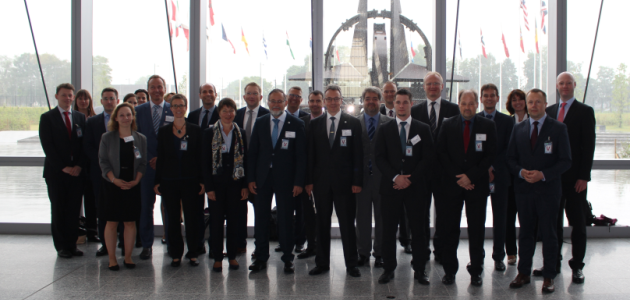
NATO in Brussels is a regular station of the Core Course. In 2018, the course was the first German delegation to visit the new NATO headquarters completed shortly before. Picture: BAKS.
The Core Course of the Federal Academy for Security Policy (BAKS) imparts an interministerial understanding of national and international security policy. With the alarming signals of US President Trump, the persistent threat situation in Eastern Europe and the political polarization in the European Union, the 2018 Course was confronted with a hitherto unknown complexity of the German security environment. Based on preparation by national and international expertise in Germany, the course conducted study tours to the US, to the Baltic area and to Brussels to form an opinion on site and draw strategic conclusions for German security policy.
Storm over the Atlantic
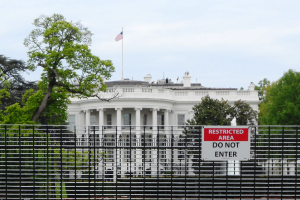
The White House seems to be closed ‑ even to many allies at the moment. Picture: BAKS/Knoechelmann.
Neither the justifications voiced by Chinese and Russian representatives ahead of the course in a partly extremely self-confident manner for their sometimes aggressive foreign and economic policies nor quite a few critical tones from the US had come as a surprise. What no one expected, however, was that the US conversation partners in Berlin and Washington formulated their positions and problems in view of Germany and Europe in such a coordinated and unanimous way. While President Trump seems to act erratically at times, a uniform line became apparent here which unmistakably calls on Germany to reach the investment target of 2 % of the gross domestic product for defense spending stipulated by NATO in 2014. Clear criticism was also leveled at Germany's allegedly too close relations with China, the Nord Stream 2 gas pipeline and the adhesion to the nuclear deal with Iran.
An essential finding of the course from the talks with the US Administration, but also with representatives of international and nongovernmental organizations in the US, was that the frequently invoked transatlantic friendship seems to be no longer existent at least at the high political level. The US has been concentrating on its own well-being and ‑ in security matters ‑ increasingly on other regions of the world not only since Donald Trump's assumption of office. The United States demands clear positioning of its partners toward potential competitors and political opponents and expects a considerably extended European and particularly German contribution to international security.
How should Germany and the EU deal with this? In the discussions, positions ranged from a certain understanding for the US attitude to its vehement disapproval. On the one hand, Germany could comply with the US demands. By a significant increase of its expenditure qualifying as a contribution in the NATO context, it could come closer to the financial demands and additionally change the balance of trade by, for instance, massive defense purchases in the US. On the other hand, more independence of Europe from the US in (security-)political terms could be sought. In view of the internal disunity of the EU, only the cooperation of a group of countries around the two heavyweights Germany and France would probably be worthy of consideration.
Hard times for multilateralism
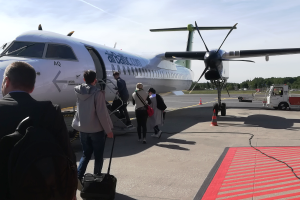
The study tours are an integral part of the Core Course to form an opinion on site.
Picture: BAKS/Knoechelmann
The bi- and multilateral resentments were also clearly noticeable during the visits to international organizations and institutions. Representatives of the United Nations praised the apparently stronger German commitment in UN missions, for instance, but at the same time were truly concerned about the growing criticism and the waning US interest in the world organization. By now, this finds expression not only in the decline in payments, but also in the withdrawal of the US from treaties and suborganizations such as the UNESCO. In Brussels, however, NATO representatives are apparently unimpressed by the permanent discussion about the seemingly unfair distribution of the burdens – this impression is even emphasized by the futuristic design of the new headquarters which the Core Course had the pleasure to visit as the first German delegation. The defense alliance confirms its unity, which is visible, for instance, in the rotation of multinational battle groups to Estonia, Latvia and Lithuania established after 2014 to deter Russia (Enhanced Forward Presence).
The European Union, on the other hand, is obviously still shocked by the Brexit and the openly uncooperative stance of some members – with a view to the east and increasingly also to the south, it seems to be less a union than ever. It seeks to generate commonalities mainly in the defense policy. The main emphasis is put on the initiatives in connection with the Permanent Structured Cooperation (PESCO) for more coordination and a more effective pooling of capabilities in defense which, however, encouraged the Core Course to enter into a critical discussion. It at least remained uncertain even after extensive talks with national and EU representatives in Brussels to what extent the 17 (individual) projects adopted for the time being will contribute to a lasting improvement of the EU's capacity for common action or if they will remain mere piecemeal work.
New threat from the east
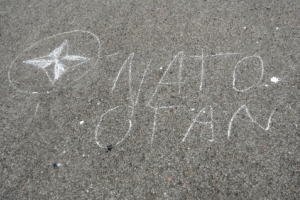
In Estonia, the threat perception toward Russia is omnipresent, and NATO enjoys broad approval among the population. This picture shows a chalk drawing in front of the town hall in Estonia's Narva. Picture: BAKS/Knoechelmann
The regional focus of the 2018 Core Course was the Baltic area where neutral countries such as Sweden, NATO members such as the Baltic states and Poland, multinational NATO forces, and Russia meet in a confined space. The study tour to the key region led from Stockholm via Tallinn and Riga to Warsaw. The perception of a new threat from the east was clearly noticeable in Sweden, Estonia and Latvia. In Estonia in particular, there was a tangible determination to counter it in the classical military way, but also by unconventional means such as a home guard ("Kaitseliit"). It remains an open question how to deal properly with the Russian-speaking minority in Estonia which has been granted a special status after the independence of the Baltic states in 1991.
The visit to Warsaw made it clear that the German-Polish relationship has cooled off markedly. While these relations are officially assessed in Germany as deteriorated but still good, German representatives on site voice a certain resignation and helplessness. The threat perception due to Russia's course of action in Ukraine was tangible in Poland as well. In all talks, it could be recognized that Poland does not entrust its security to Europe but definitely looks in the direction of the US.
Domestic dicsussions
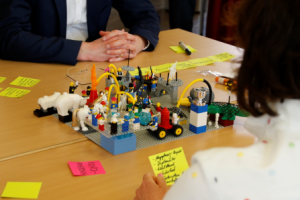
Touching complex problems: The BAKS relies in its courses on innovative learning methods such as Lego Strategic Play. Picture: BAKS.
In addition to the international perspective, the Internal Security course module specifically had an eye on the domestic German situation. This includes, for instance, aside from the classical fields of police, justice and intelligence service, also questions of critical infrastructure. As an example, the latent hazard and complexity of the protection of electric energy as an important resource became apparent at the company headquarters of an energy provider. Problems arising from the unsteadiness of renewable energies and their transportation became evident, too.
The subject areas of migration and integration were considered during a visit to a trouble spot school and a guided tour of Berlin-Neukölln. The talks with government and civil society actors on site and the look into the reality of Neukölln showed the strong commitment of, for instance, teachers, police officers and district mothers in their efforts to help. They also showed, however, that integration can only work if there is a home-based (native) basis for integration. This is obviously no longer the case in some areas of Berlin.
Strategies wanted
Determining subjects of numerous rounds of discussions during the course were the possibilities, the limits and the concrete design of federalism, the coordination of government work and the related exercise of the power to determine government policies, as well as the interpretation of the principle of ministerial responsibility sometimes perceived as inhomogeneous. The Strategic Foresight subject accompanying the course gave the attendees of the course food for thought about this. Longer-term foresighted thinking in scenarios sometimes appearing deliberately far-fetched, the derivation of strategies based on this and appropriate communication of these strategies to the public were discussed theoretically and practiced. A scenario exercise based on this was set in the visited Baltic area and dealt, inter alia, with the subject of digitization.
More information on Core Course on Security Policy of the BAKS can be found online.
Author: Colonel (GS) Jörg Knoechelmann is the Course Director of the Federal Academy's Core Course on Security Policy. The author expresses his personal opinion.
